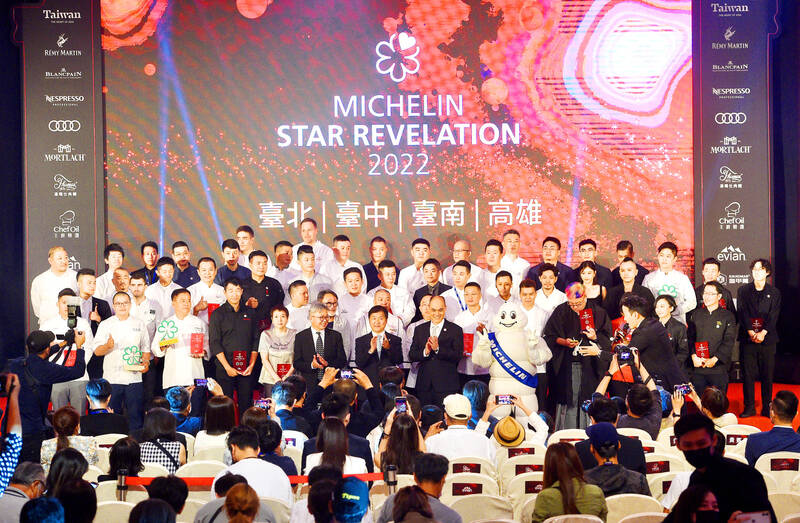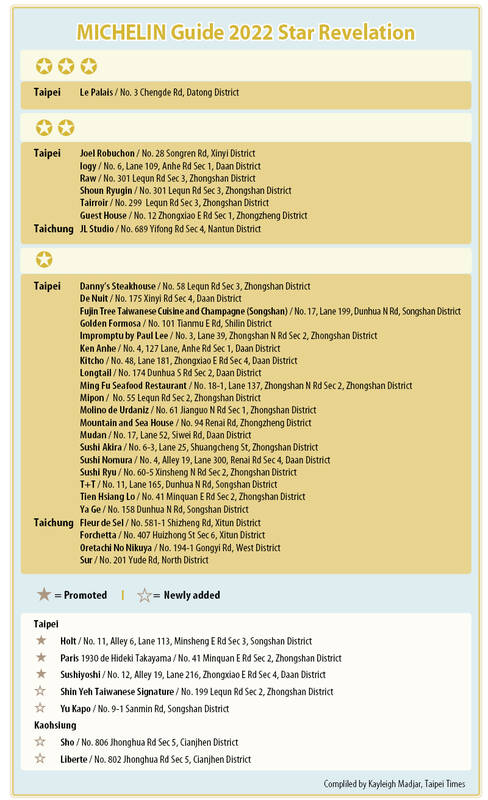No restaurants in Tainan were awarded stars by the Michelin Guide this year, despite the city’s reputation as the capital of traditional Taiwanese food.
The France-based gourmet publication began evaluating restaurants in Taipei in 2018, with eateries in Taichung included in 2020.
Michelin Guide inspectors expanded their culinary search this year by also evaluating restaurants in Tainan and Kaohsiung.

Photo: Lo Pei-te, Taipei Times
Michelin yesterday morning unveiled its list for this year of 38 starred restaurants in Taiwan at the Mandarin Hotel in Taipei. Tainan was the only one of the four cities that did not have a restaurant with a star rating.
Instead of expressing disappointment, people from Tainan said they could not care less about the result, with some even saying that they were relieved.
“We would not be called the gourmet capital of Taiwan if we did not have taste buds that can scrutinize food quality better than those of Michelin food inspectors. We are proud of our tasty food and do not need to have it reviewed by the Michelin Guide,” a resident surnamed Chao (趙) wrote on the Tainan-Style Facebook page.

GRAPHIC: TT
“I thank Michelin Guide for giving us a break, otherwise lines outside popular restaurants here would be long enough to reach Pingtung County,” another person surnamed Yeh (葉) wrote.
Others said that while food in Tainan is delicious, it has a long way to go regarding overall quality in the city.
Minister of Transportation and Communications Wang Kwo-tsai (王國材) said that he respects the Michelin Guide for using consistent criteria to evaluate restaurants around the world.
That many restaurants serving traditional Taiwanese food in Tainan made it onto the guide’s Bib Gourmand list showed that food in the city is recognized by the publication, Wang said.
Many cities use the Michelin Guide as a way to attract tourists, and restaurants that want a star rating have to work hard to achieve it, he said.
It is not the first time the tastes of Michelin food inspectors have clashed with those of locals; many have said that Din Tai Fung should receive a star.
Seven restaurants were added to the list of one-star restaurants this year, including Holt, Paris 1930 de Hideki Takayama, Shin Yeh Taiwanese Signature, Sushiyoshi and Yu Kapo in Taipei, as well as Sho and Liberte in Kaohsiung.
Restaurants that retained their one star were: Danny’s Steakhouse, De Nuit, Fujin Tree Taiwanese Cuisine and Champagne (Songshan), Golden Formosa, Impromptu by Paul Lee, Ken Anhe, Kitcho, Longtail, Ming Fu Seafood Restaurant, Mipon, Molino de Urdaniz, Mountain and Sea House, Mudan, Sushi Akira, Sushi Nomura, Sushi Ryu, T+T, Tien Hsiang Lo and Ya Ge in Taipei, as well as Fleur de Sel, Forchetta, Oretachi No Nikuya and Sur in Taichung.
In Taipei, Da-Wan Yakiniku Dining Restaurant and A Cut failed to retain their one-star rating this year.
Seven of last year’s eight two-star restaurants retained their status: JL Studio in Taichung, and L’Atelier de Joel Robuchon, Logy, RAW, Shoun Ryugin, Tairroir and The Guest House in Taipei.
Sushi Amamoto did not make it onto the list of two-star restaurants. No new restaurants gained two stars.
Le Palais of the Palais de Chine Hotel remains the only three-star restaurant in Taiwan. It has maintained this status since 2018.
Mountain and Sea House, Yang Ming Spring (Shilin), Embers and Little Tree Food (Daan Road) in Taipei were given Green Stars for their sustainable management.

Three Taiwanese airlines have prohibited passengers from packing Bluetooth earbuds and their charger cases in checked luggage. EVA Air and Uni Air said that Bluetooth earbuds and charger cases are categorized as portable electronic devices, which should be switched off if they are placed in checked luggage based on international aviation safety regulations. They must not be in standby or sleep mode. However, as charging would continue when earbuds are placed in the charger cases, which would contravene international aviation regulations, their cases must be carried as hand luggage, they said. Tigerair Taiwan said that earbud charger cases are equipped

Foreign travelers entering Taiwan on a short layover via Taiwan Taoyuan International Airport are receiving NT$600 gift vouchers from yesterday, the Tourism Administration said, adding that it hopes the incentive would boost tourism consumption at the airport. The program, which allows travelers holding non-Taiwan passports who enter the country during a layover of up to 24 hours to claim a voucher, aims to promote attractions at the airport, the agency said in a statement on Friday. To participate, travelers must sign up on the campaign Web site, the agency said. They can then present their passport and boarding pass for their connecting international

UNILATERAL MOVES: Officials have raised concerns that Beijing could try to exert economic control over Kinmen in a key development plan next year The Civil Aviation Administration (CAA) yesterday said that China has so far failed to provide any information about a new airport expected to open next year that is less than 10km from a Taiwanese airport, raising flight safety concerns. Xiamen Xiangan International Airport is only about 3km at its closest point from the islands in Kinmen County — the scene of on-off fighting during the Cold War — and construction work can be seen and heard clearly from the Taiwan side. In a written statement sent to Reuters, the CAA said that airports close to each other need detailed advanced

The age requirement for commercial pilots and airline transport pilots is to be lowered by two years, to 18 and 21 years respectively, to expand the pool of pilots in accordance with international standards, the Ministry of Transportation and Communications announced today. The changes are part of amendments to articles 93, 119 and 121 of the Regulations Governing Licenses and Ratings for Airmen (航空人員檢定給證管理規則). The amendments take into account age requirements for aviation personnel certification in the Convention on International Civil Aviation and EU’s aviation safety regulations, as well as the practical needs of managing aviation personnel licensing, the ministry said. The ministry